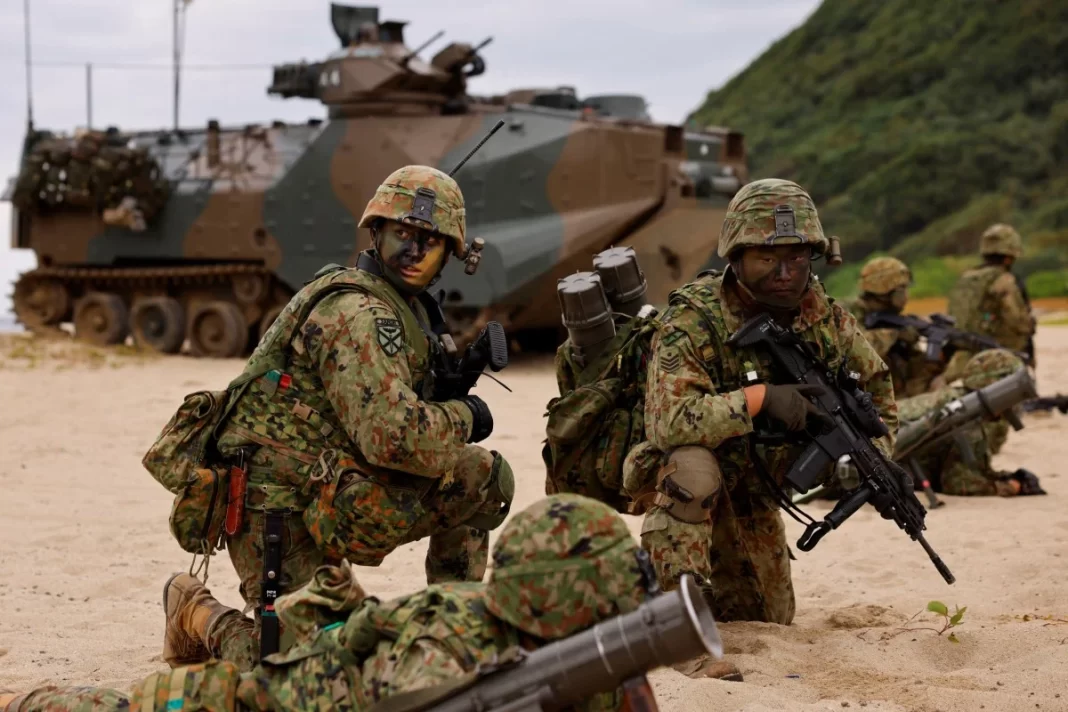Historic Defense Pact in the Making
Japan and the Philippines are making significant progress toward a landmark Reciprocal Access Agreement (RAA) that could reshape regional security. This agreement would allow military forces from both nations to operate on each other’s soil for joint exercises. Japanese Foreign Minister Takeshi Iwaya’s visit to Manila this week signals Tokyo’s commitment to deepening ties with the Philippines under their “strengthened strategic partnership.”
Key Discussions on Defense Cooperation
Iwaya’s two-day visit highlights efforts to finalise the RAA. Discussions with Philippine Foreign Minister Enrique Manalo aim to reaffirm commitments and explore opportunities for enhanced collaboration. Both nations are long-standing U.S. allies, and this pact aligns with Washington’s broader strategy to counter China’s assertiveness in the South China Sea.
Japan is keen to support the Philippines with advanced technology and military equipment, including radars and coastguard ships. These measures bolster Manila’s ability to maintain sovereignty in its waters and contribute to regional security.
Challenges to Ratification in Japan
While the Philippine Senate has ratified the RAA, Japan faces domestic hurdles. Prime Minister Shigeru Ishiba must navigate political challenges, including opposition parties in Japan’s parliament. Delays in ratification stem from concerns over antagonizing China, but analysts suggest Tokyo’s commitment to security partnerships will ultimately prevail.
The Ishiba administration’s focus on maintaining continuity in foreign policy has been crucial. Observers believe Japan is carefully balancing its defense priorities with its economic and diplomatic relations in the region.
Expanding Trilateral Cooperation
Japan’s collaboration with the Philippines and the U.S. marks a significant shift in its regional strategy. Recent trilateral talks between the nations emphasized economic, maritime, and technological cooperation. This alignment underscores the shared goals of promoting a free and open Indo-Pacific.
The strategic importance of the Indo-Pacific to Japan’s security and economy cannot be overstated. As regional tensions escalate, Japan seeks to reinforce its alliances while addressing global challenges such as maritime security, climate change, and economic growth.
Beyond Defense: A Holistic Approach
Iwaya’s visit is not limited to defense. It also emphasizes economic and strategic cooperation. Both nations are working on broader initiatives, including infrastructure development and the Free and Open Indo-Pacific Partnership.
The partnership between Japan and the Philippines extends into economic fields, with Japan playing a key role in the development of critical infrastructure projects in the Philippines. This cooperation strengthens economic ties and reinforces regional stability.
Aligning with U.S. Priorities
The partnership also aligns with the incoming U.S. administration’s policies. President-elect Donald Trump’s focus on bilateralism and trilateral cooperation is expected to influence the direction of U.S.-Japan-Philippine relations.
Japan’s efforts to strengthen ties with the Philippines are seen as a way to align its strategy with U.S. priorities. This alignment ensures that the trilateral cooperation framework remains robust, addressing shared security concerns and fostering economic growth in the region.
Outlook for the Reciprocal Access Agreement
While the exact timeline for Japan’s ratification of the RAA remains uncertain, there is optimism about progress. Historical precedents suggest that the agreement could be finalized within months. The upcoming Diet session in Japan offers an opportunity for further discussions and potential ratification.
The RAA represents a critical step in enhancing security cooperation between Japan and the Philippines. It also reflects Japan’s broader commitment to regional stability and its proactive role in addressing emerging challenges.
A Strategic Path Forward
Japan’s focus on strengthening its partnership with the Philippines is a testament to its commitment to regional security and economic development. The ongoing collaboration between the two nations highlights the importance of shared values and mutual interests in shaping the future of the Indo-Pacific.
With the RAA poised to become a cornerstone of their relationship, Japan and the Philippines are set to play a pivotal role in promoting peace, stability, and prosperity in the region. The partnership not only strengthens bilateral ties but also contributes to a stronger, more united Indo-Pacific.

